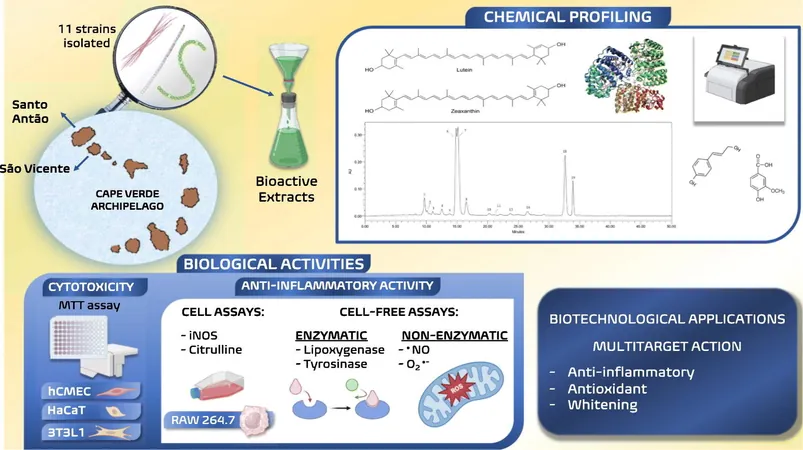
Unlocking the Secrets of Marine Cyanobacteria: The Next Wave in Anti-Inflammatory Skin Solutions!
2024-12-19
Author: Arjun
Inflammation: A Global Concern for Skin Health
Inflammation, a natural defense mechanism of the body, can manifest in various forms, particularly affecting the skin. Conditions such as dermatitis, inflammatory acne, and rosacea lead to discomfort characterized by redness, swelling, and itching, impacting millions worldwide. As these skin issues rise, the cosmetics industry faces an urgent challenge to develop effective, health-promoting solutions that not only enhance appearance but also support overall well-being.
Harnessing Marine Cyanobacteria for Skin Solutions
In response to this pressing need, research led by Janaina Morone and her team at CIIMAR's Blue Biotechnology, Environment and Health group, emphasizes the potential of marine cyanobacteria in creating innovative anti-inflammatory products. Their study, published in *Algal Research*, reveals how specific carotenoid profiles found in cyanobacteria can significantly diminish the production of inflammatory mediators.
Why Cyanobacteria? A Natural Powerhouse!
Cyanobacteria, often referred to as "blue-green algae," are recognized for their ability to produce a range of pigments, including well-known carotenoids like zeaxanthin and β-carotene. These compounds not only give the cyanobacteria their vibrant colors but also play a pivotal role in modulating inflammatory processes in the skin. By sequestering free radicals and inhibiting inflammatory enzymes, these extracts can help both soothe existing inflammation and prevent new flare-ups.
Morone highlights the sustainable and innovative nature of cyanobacteria, stating, "Cyanobacteria fulfill all these requirements as a bio-resource. Our investigations into strains from the Cape Verde archipelago confirmed their potent anti-inflammatory effects." Such findings suggest that these marine organisms could revolutionize the way we approach skin inflammation in cosmetics.
Toxicity Myths Busted!
There is often skepticism surrounding the safety of compounds derived from cyanobacteria due to fears of toxicity. However, the findings from this study indicate that many cyanobacterial strains, particularly those examined from Cape Verde, do not produce harmful toxins and exhibit no toxicity to tested cell lines. This crucial information not only assures safety for consumers but also opens avenues for further research and application in cosmetics, pharmaceuticals, and nutraceuticals.
The Future Looks Bright—And Blue!
As the research continues, scientists stress the importance of exploring the full potential of cyanobacteria in both cosmetic and pharmacological applications. By elucidating the mechanisms of action and assessing the stability of these extracts when incorporated into formulations, the path ahead promises exciting opportunities.
"Lopes reinforced the significance of marine resources, noting that they present unparalleled possibilities in developing new, eco-friendly ingredients that meet today's market's demands for innovation and sustainability. Indeed, marine biotechnology is at the forefront of creating solutions that cater to a growing global population focused on health and sustainability," Morone adds.
Conclusion: The Next Frontier in Skincare
With their unique properties and sustainable production, marine cyanobacteria could indeed be the breakthrough ingredient the cosmetics industry has been waiting for. As demand rises for natural, effective solutions that restore skin health without compromising environmental values, the quest for the perfect anti-inflammatory compound may very well be answered by these tiny, yet powerful organisms from the sea.
Watch this space, as the future of skincare innovations shines a vibrant shade of blue!



 Brasil (PT)
Brasil (PT)
 Canada (EN)
Canada (EN)
 Chile (ES)
Chile (ES)
 España (ES)
España (ES)
 France (FR)
France (FR)
 Hong Kong (EN)
Hong Kong (EN)
 Italia (IT)
Italia (IT)
 日本 (JA)
日本 (JA)
 Magyarország (HU)
Magyarország (HU)
 Norge (NO)
Norge (NO)
 Polska (PL)
Polska (PL)
 Schweiz (DE)
Schweiz (DE)
 Singapore (EN)
Singapore (EN)
 Sverige (SV)
Sverige (SV)
 Suomi (FI)
Suomi (FI)
 Türkiye (TR)
Türkiye (TR)